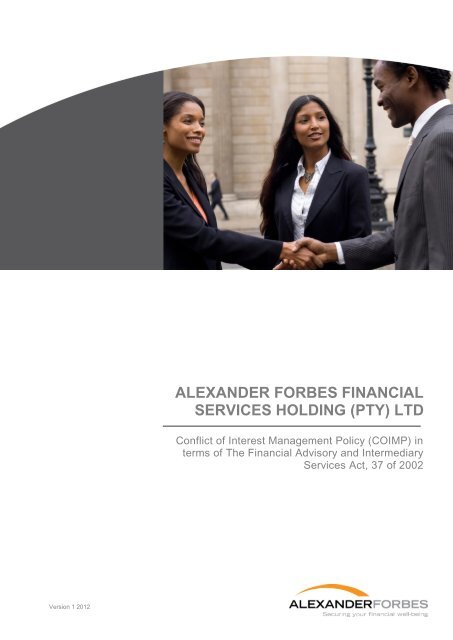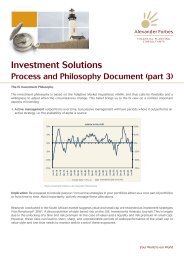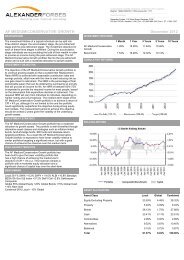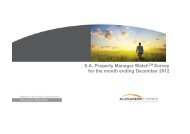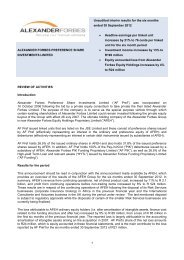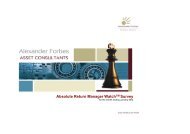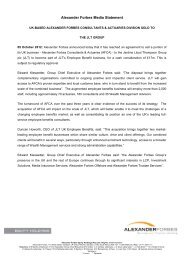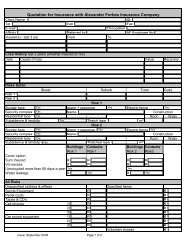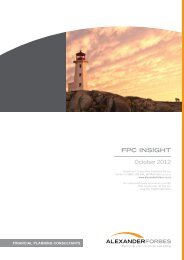ALEXANDER FORBES FINANCIAL SERVICES HOLDING (PTY) LTD
ALEXANDER FORBES FINANCIAL SERVICES HOLDING (PTY) LTD
ALEXANDER FORBES FINANCIAL SERVICES HOLDING (PTY) LTD
You also want an ePaper? Increase the reach of your titles
YUMPU automatically turns print PDFs into web optimized ePapers that Google loves.
<strong>ALEXANDER</strong> <strong>FORBES</strong> <strong>FINANCIAL</strong><strong>SERVICES</strong> <strong>HOLDING</strong> (<strong>PTY</strong>) <strong>LTD</strong>Conflict of Interest Management Policy (COIMP) interms of The Financial Advisory and IntermediaryServices Act, 37 of 2002Version 1 2012Version 1
A. PREAMBLEAlexander Forbes Financial Services Holdings (AFFSH) strives to maintain the highest ethicalstandards in carrying out our business activities. Our reputation is one of our most importantassets, so all of our operations and the way we do business are guided by our set of corevalues.We recognise our obligations to our various stakeholders – insurers, intermediaries andfinancial service providers, brokers, shareholders, employees and representatives,customers, suppliers, competitors and the wider community. This policy sets appropriateprinciples and processes to deal with specific ethical issues that arise in specificcircumstances.We will monitor ethical performance regularly to eliminate corrupt or unethicalbusiness practices. The cornerstone of ethical conduct is to avoid actual or potential conflictsof interest. In circumstances where we cannot avoid conflicts, we need to follow theseguidelines to ensure proper disclosure to mitigate these actual or potential conflicts. We alsohave to ensure that staff members on a performance based salaries are closely monitored toensure that they do not compromised quality to focus on quantity performancemeasurements.The purpose of this policy is to provide measures to identify manage and avoid existing andpotential conflicts of interests within our environment and set out the roles and responsibilitiesof the relevant parties. We will publish the policy will on an internet website where clients caneasily access it.B. DEFINITIONSFor the purposes of the guidelines, we have used the following definitions have been used:AFEHAFFSHAssociateAlexander Forbes Equity Holdings (Proprietary)LimitedAlexander Forbes Financial Services Holdings(Proprietary) LimitedIn relation to a natural person, means:(i)(ii)(iii)(iv)A person who is recognised in law orthe tenets of religion as the spouse,life partner or civil union partner ofthat person.A child of that person, including astepchild, adopted child and a childborn out of wedlock.A parent or stepparent of that person.A person who is recognised in law orappointed by a court as the person legallyresponsible for managing the affairs of ormeeting the daily care needs of the firstmentioned person.In relation to a juristic person, means:(i)A company, any subsidiary or holdingcompany of that company, any otherVersion 1 2012Version 1
(ii)(iii)subsidiary of that holding company andany other company of which that holdingcompany is a subsidiary.Any member of a close corporationregistered under the Close CorporationsAct,1984 (Act No. 69 of 1984), as definedin section 1 of the act.Another juristic person which is not acompany or a close corporation asreferred to in subparagraphs (i) or (ii), thatwould have been a subsidiary or holdingcompany of the first-mentioned juristicperson:(aa) Had such first-mentioned juristicperson been a company; or(bb) In the case where that other juristicperson, too, is not a company, had boththe first-mentioned juristic person and thatother juristic person been a company.(iv)Any person in accordance with whosedirections orinstructions the board of directors or, in thecase where such juristic person is not acompany, the governing body of suchjuristic person is accustomed to act.In relation to any person, means:(i)(ii)Any juristic person of which the board ofdirectors or, in the case where suchjuristic person is not a company, ofwhich the governing body isaccustomed to act in accordance withthe directions or instructions of theperson first-mentioned in thisparagraph.Any trust controlled or administered bythat person.ClientsCompliance officerConflict of interestA specific person or group of persons, excluding thegeneral public, who is or may become the subject towhom a financial service is rendered intentionally, oris the successor in title of such person or thebeneficiary of such service.The statutory compliance officer appointed in termsof the Financial Advisory and Intermediary ServicesAct in relation to the AFFSH financial serviceproviders.Any situation in which a financial service provider or arepresentative has an actual or potential interest thatmay, in giving a financial service to a client:(a) Influence the objective performance of his, heror its obligations to that client.Version 1 2012Version 1
(b) Prevent that service provider or representativefrom giving an unbiased and fair financialservice to that client, or from acting in theinterests of that client.Including but not limited to:(i) A financial interest(ii) An ownership interest(iii) Any relationship with a third party.EmployeeFAISFinancial interestIncludes permanent employees, temporary employees,independent contractors and employees or contractorsof contracted service providers, of any of the corporateentities forming part of the Group.Financial Advisory and Intermediary Services Actno.37 of 2002 and all regulations, board notices andcodes of conduct issued in terms of the act.A financial interest includes cash, cash equivalent,voucher, gift, services, advantage, benefit, discount,domestic or foreign travel, hospitality, accommodation,sponsorship, or other incentive, or valuableconsideration other than:(a) An ownership interest(b) Training by a product supplier on products,general industry information and technicalsystems, that is not exclusively available to aselected group of FSPs or representativesexcept for travel and accommodationassociated with that training.FSPImmaterial financial interestKey individualFinancial service provider authorised in terms of theFinancial Advisory and Intermediary Services Act2002;Any financial interest with a determinable monetaryvalue, the aggregate of which does not exceed R1 000in any calendar year from the same third party in thatcalendar year received by:(a) A provider, who is a sole proprietor.(b) A representative for that representative’sdirect benefit.(c) A provider, who for its benefit or that of someor all of its representatives, aggregates theimmaterial financial interest paid to itsrepresentatives.A person registered as such in terms of FAIS tooversee and manage the business or representativesof AFFSH.PersonAny natural person, partnership or trust. Includes-anyorgan of state as defined in section 239 of theConstitution of the Republic of South Africa, 1996(Act No.108 of 1996);Version 1 2012Version 1
Ownership interestAn equity ownership interest, for which the owner paidfair value. This excludes equity or ownership interestheld by an approved nominee on behalf of anotherperson. It includes any dividend, profit share or similarbenefit derived from that equity or ownership interest.Permitted financial interest(i)(ii)(iii)(iv)(v)(vi)(vii)Commission authorised under the LongTerm Insurance Act (Act no. 52 of 1998) orthe Short Term Insurance Act (Act no. 53of 1998).Commission authorised under the MedicalSchemes Act (Act no. 131 of 1998).Fees authorised under the Long TermInsurance Act (Act no. 52 of 1998), theShort Term Insurance Act (Act no. 53 of1998) or the Medical Schemes Act, (Actno. 131 of 1998) if those fees arereasonable compensation for the serviceprovided.Fees charged for a financial service forwhich commission referred to insubparagraph (i), (ii) or (iii) is not paid, if:(aa) The client specifically agreed inwriting to the fees; and(bb) The client may stop the fee at his orher discretion.Fees or remuneration for a service to athird party if these fees or remunerationare reasonably compensation for theservice being delivered.Subject to any other law, an immaterialfinancial interest; andA financial interest, not referred to undersubparagraph (i) to (iv), for which theprovider or representative pays aconsideration, fair value or remunerationthat is reasonable compensation for thefair value of the financial interest, at thereceipt thereof.RepresentativeThird partyAny employee of an FSP who renders financialservices to a client on behalf of an FSP as definedin the FAIS Act.(a) A product supplier(b) Another FSP(c) An associate of a product supplier or an FSP(d) A distribution channel(e) Any person who, in terms of an agreement orarrangement with a person referred to inparagraphs (a) to (d) above, provides afinancial interest to a provider or itsrepresentatives.Version 1 2012Version 1
AVOIDING CONFLICTS OF INTEREST1. OBJECTIVESEmployees have a duty to act in the best interest of the client or AFFSH, that’s whyemployees and representatives are not allowed to do anything that could be a conflict ofinterest.The primary objectives of this policy are:• To give employees guidance on how to behave in accordance with the Group values.• To promote transparency and avoid - or where avoidance is impossible, mitigate -business-related conflicts of interest.• To ensure fairness in the interests of clients, employees and AFFSH.• To document the process for the disclosure, approval and review of activities whichmay amount to actual, potential or perceived conflicts of interest.• To provide a mechanism for the objective review of personal outside interests.2. SCOPEThe requirements outlined in this policy apply to all employees and representatives ofAFFSH. This policy regulates processes and procedures in accordance with existing legalduties that an employee owes an employer and should therefore not be construed orapplied in a manner contrary to such duties and obligations, nor is it designed to replacesuch duties and obligations.3. ROLES AND RESPONSIBILITIESBoard of directorsThe board of directors is ultimately responsible for the conflict of interest management(“COIM”) policy.Executive committee (“EXCO”)The EXCO is the most senior decision making forum under the board of directors. It isresponsible for:• Drafting and implementation of this COIM policy and for submitting it to the board ofdirectors consideration and approval.• Ensuring that all employees, representatives and where appropriate, associates, aremade aware of the contents of the COIM policy including training or education in thisregard.• Ensuring that the COIM Policy is published in appropriate media and that it’s easilyaccessible for public inspection at all reasonable times.Key individuals (“KIs”)In terms of the FAIS Act, the KIs are responsible for managing or overseeing the activitiesof the AFFSH FSPs as they offer financial services. In terms of this COIM policy, the KIsare responsible for implementing it and training staff, especially as it relates to the FAISAct.Compliance officersCompliance officers are responsible for:• Submitting annual compliance reports submitted to the Registrar of Financial ServicesProviders under the FAIS Act. These reports must deal with the monitoring of,compliance with and accessibility of the COIM policy.Version 1 2012Version 1
• Provide relevant input and guidance to the operational areas or support functions.• Monitor and maintain a register of conflicts of interest management. All declarationforms completed by employees and representatives are kept in this register.4. MECHANISMS FOR INDENTIFYING CONFLICTS OF INTERESTGiven the nature and complexity of the business of providing financial products andservices through a number of legal entities, we have identified a number of mechanismsto identify potential conflicts of interest:• Key individuals will conduct ad hoc checks on business transactions to ensure thatthe AFFSH’s COIM policy is being complied with.• AFFSH will maintain a conflict of interest register and update it regularly with all newconflicts of interest identified within the FSP.• All new employees must receive a copy of the COIM policy• The register (Annexure B) must be completed to record the conflicts of interest, theseverity and the mechanisms used to avoid or mitigate conflicts of interest goingforward.• All employees, representatives, key individuals and compliance officers within FSPswill be trained on the COIMP and will be responsible for identifying specific instancesthereof.• Feedback and complaints from clients or other stakeholders.• All employees, representatives and key individuals will be obliged to notify thedivisional compliance officer of any instances they become aware of.• The divisional compliance officer will record the conflict of interest in the register andassist the reporting manager to decide on how the conflict should be managed withinthe guidelines of the conflict of interest management policy. The divisionalcompliance officer will also provide internal guidelines to AFFSH on an ad hoc basis.5. THE MEASURES FOR AVOIDANCE OF CONFLICTS OF INTEREST• Alignment of all current business practices, procedures and relationships with FAIS.• Training and maintenance of awareness levels of regulatory requirements.• Culture of compliance and company values.• Compliance performs regular FAIS audits to verify that AFFSH procedures andprocesses are followed.• Adherence and reporting under the AFFSH gift and entertainment policy.6. <strong>FINANCIAL</strong> INTEREST TO AND FROM THIRD PARTIESAFFSH and its representatives may only offer or receive a permitted financial interestfrom a third party, other than an immaterial financial interest and bona fide training andeducational sessions as set out hereunder.7. TRAINING AND EDUCATION SESSIONSAFFSH may receive or provide the following training:Training which is not exclusively available to a selected group of FSPs or representatives.The training permitted must only relate to:(i)(ii)Products and legal matters relating to those productsGeneral financial and industry informationVersion 1 2012Version 1
(iii)Specialised technological systems of a third party necessary for the rendering of afinancial service.An FSP providing the training may not provide travel and accommodation to the otherFSP or representative attending the training.Light refreshments and modest meals incidental to the training may be provided if thetraining time extends over meal times or ends reasonably close in time to the next mealtime.8. <strong>FINANCIAL</strong> INTERESTS TO OWN REPRESENTATIVESAFFSH representatives are remunerated in the form of salaries and some of them may beeligible for the payment of guaranteed 13 th cheque or in certain instances annualperformance bonuses that recognises their overall contribution to the performance ofAFFSH and the Alexander Forbes Group as a whole. Salaries are paid in accordancewith employment contract and in instances where a representative is paid a performancebonus it is calculated on a formula which includes the net profit performance of theAlexander Forbes Group and AFFSH and the overall performance appraisal of theindividual concerned.AFFSH may not offer any financial interest to its representatives for givingpreference to:• The quantity of business to the exclusion of the quality of service given to clients.• A specific product supplier, where a representative may recommend more than oneproduct supplier.• A specific product of the product supplier where the representative may recommendmore than one product of that supplier.• This means that:• All remuneration packages, bonus and incentive programmes and competitions mustbe structured in line with these rules.• There must be full disclosure to clients who are referred to specific providers,suppliers or products.• Where required, there is full disclosure to clients on all AF Group products.9. IMMATERIAL <strong>FINANCIAL</strong> INTERESTAFFSH may accept or offer an ‘immaterial financial interest’ if it does not exceed R1 000per natural person per year from or to the same third party.If AFFSH aggregates the immaterial financial interest for the benefit of some of the thirdparty’s representatives, it will be penalised and will only be entitled to give a R1 000 intotal to that third party. The immaterial financial interest must be allocated on an individualbasis.10. LIST OF THIRD PARTIES IN WHICH AFFSH HOLDS AN OWNERSHIP INTERESTThe definition of third party according to Board Notice 58 means a product supplier,another provider, an associate of a product supplier or a provider, a distribution channel,or any other person that in terms of an agreement or arrangement with a person referredto in the preceding list provides a financial interest to a provider or its representatives. Interms of this definition, AFFSH FSPs do not have ownership interests in third partiesoutside the AF Group.Version 1 2012Version 1
11. LIST OF THIRD PARTIES THAT HOLD AN OWNERSHIP INTEREST IN AFFSHFSP’SThe definition of third party according to Board Notice 58 means a product supplier,another provider, an associate of a product supplier or a provider, a distribution channel,or any other person that in terms of an agreement or arrangement with a person referredto in the preceding list provides a financial interest to a provider or its representatives. Interms of this definition, AFFSH FSPs do not have ownership interests in third parties.12. LIST OF ASSOCIATESCompanies that are associated to AFFSH are those which are part of the AlexanderForbes Group of companies of which AFFSH is itself a subsidiary, but limited only tooperating companies and holding companies of operating companies. Please refer toAnnexure A.13. THE OBLIGATION TO DISCLOSE• Every employee must fully communicate and disclose any conflict of interest thatcould impair or be perceived to impair their ability to act with integrity or objectivity intheir role at AFFSH immediately once identified. They must disclosure conflicts ofinterest and update the Master Conflicts of Interest register (see Annexure B)accordingly.• All employees must forward their disclosures to the Group or regional managerresponsible for the particular branch or department.• Group and regional management and executive managers must forward theirdisclosures to the company secretary who will consider the disclosures and decide ontheir permissibility.• Where applicable, the representatives should inform clients of the conflict of interestdisclosures as required.• Employees and representatives must disclose all conflicts of interest (including preexistingconflicts of interest) yearly. In addition, if a conflict of interest arises or mayarise, employees must disclose it before undertaking any activity, at the beginning ofany negotiations or at the beginning of any decision-making process. In exceptionalcircumstances, the formalities of disclosure may be finalised after the event ininstances where time is of the essence and the substance of this policy has beencomplied with, provided that the formalities are completed afterwards. A newdisclosure must be made if the facts and circumstances relating to a previouslydisclosed interest or activity changes materially, thereby introducing a newundisclosed interest.• The representatives will give clients documentation confirming the structure of AFFSHand the Group and disclosing their conflicts of interests, in line with current disclosureprocedures.14. APPROVALWhere management considers the conflict potential of an activity or interest to be minimaland there is no risk of reputational damage to AFFSH, employees must record approvalof this activity on the Annexure. They must also note any conditions attached to theapproval on the form. This must be reviewed yearly to ensure that the basis on whichapproval was granted remains sound. The employee applying for approval may notundertake the activity or make any decisions on behalf of AFFSH without the requiredprior written approval.Version 1 2012Version 1
Where the activity or interest that gives rise to the potential conflict of interest is judged tobe inappropriate, it should be declined. This decision must be recorded on the Annexureand communicated in writing to the relevant employee. Employees and representativeshave the right to request a review of the decision where the activity or interest is declinedor where conditional approvals are granted. Such a request must be in writing, set out thereasons for the request and include copies of all relevant documents relating to theoriginal disclosure of the activity or interest and the decisions relating thereto. The right ofreview is to the managing director.15. MAINTAINING INDEPENDENCEIn all situations in which disclosure is required, the relevant employee making thedisclosure must abstain from any decision-making relating to the conflicted activityor interest as well as from the process relating to the consideration of that disclosure.Where appropriate that abstention must be formally noted.16. RECORD KEEPINGIn respect of all other employees and representatives, the relevant group or regionalmanager will keep the disclosure forms. In all cases where disclosures are approved ordeclined, copies of the disclosure forms must be forwarded to the divisional complianceofficer. If managers are unsure about a potential conflict of interest, they must get clarityfrom the divisional compliance officer and record it accordingly. The FSP will keep aConflicts of Interest and Gifts register.17. RELATIONS WITH EMPLOYEES AND REPRESENTATIVESEmployees and representatives may not have any outside business interests or additionalemployment which could in any way conflict with the proper performance of their duties,unless given specific written permission to do so. Employees must disclose any personalinterest they or a member of their immediate family has in relation to the Group’sbusiness. This conflict of interest could include directorships, significant shareholdingsand employment of family members.18. COMPLIANCE AND VERIFICATION• Strict adherence to the provisions of this policy is a condition of employment with theGroup. Non-compliance with this policy and the procedures described in it may beconsidered to be misconduct and employees and representatives may be subject todisciplinary action that may lead to dismissal.• We aim to create the climate and opportunity for our employees and representativesto voice genuine concerns about behaviours or decisions that they perceive to beunethical.• The divisional compliance officer is responsible for initiating and supervising theinvestigation of all reports of breaches of this policy and assisting AFFSH to ensurethat appropriate disciplinary action is taken when required.• The Group’s auditors may be asked to report on any practice uncovered in the courseof their work that appears to breach this code of business conduct.Version 1 2012Version 1
19. APPLICABILITY OF THIS POLICYThis policy applies to authorised financial services providers, their representatives andkey individuals within AFFSH.Authorised FSP within AFFSHAlexander Forbes Financial Services (Pty) Ltd (Licence number 1177)Alexander Forbes Life Limited (Licence number 1178);Alexander Forbes Health (Pty) Ltd (Licence number 33471);Alexander Forbes Intermediary Services (Pty) Ltd (Licence number 41683);Alexander Forbes Financial Planning Consultants (Pty) Ltd (Licence number 31753);Alexander Forbes Individual Client Administration (Pty) Ltd (Licence number 32494);Alexander Forbes Retail Client Administration (Pty) Ltd (Juristic representative)Throughout this document, any reference to AFFSH will mean the abovementioned FSPs.Version 1 2012Version 1
ANNEXURE AName of Associated Companies(Excludes dormant companies)RegistrationNumberGroupAlexander Forbes Limited 1958/001974/04Alexander Forbes Equity Holdings Ltd 2006/031561/06Alexander Forbes Group & Technology Services (Pty) Ltd 1977/003357/07Alexander Forbes Preference Share Investments Ltd 2006/031561/06Alexander Forbes Acquisition (Pty) Ltd 2006/023218/07Alexander Forbes South Africa Holdings (Pty) Ltd 2003/013466/07Alexander Forbes Risk & Insurance Services (Pty) Ltd 1985/002410/07Investment Solutions Holdings Limited 1997/022540/06Alexander Forbes AfriNet Investments (Pty) Ltd 1997/004662/07Alexander Forbes Financial Services Holdings (Pty) Ltd 1995/012732/07Financial ServicesAlexander Forbes Financial Services (Pty) Ltd 1969/018487/07Alexander Forbes Health (Pty) Ltd 2007/015447/07Alexander Forbes Life Ltd 1997/022561/06Alexander Forbes Retails Holdings (Pty) Ltd 2001/011066/07Seniors Finance (Pty) Ltd 2005/039721/07Alexander Forbes Fiduciary Services Ltd 1920/002057/06Alexander Forbes Financial Planning Consultants (Pty) Ltd 1995/012764/07Alexander Forbes Individual Client Administration (Pty) Ltd 2007/015623/07Alexander Forbes Nominees (Pty) Ltd 1988/005546/07Alexander Forbes Retail Client Administration (Pty) Ltd 2010/007532/07Investment SolutionsInvestment Solutions Limited 1997/000595/06Superflex Ltd 1995/010767/06Investment Solutions Trustee Company (Pty) Ltd 2000/027207/07Investment Solutions Unit Trusts Ltd 2001/015776/06Investment Solutions Administrative Services (Pty) Ltd 2005/043273/07Caveo Fund Solutions (Pty) Ltd 2003/017504/07Risk & Insurance ServicesAlexander Forbes Risk Services (Pty) Ltd 2007/018288/07Alexander Forbes Compensation Technologies(Pty) Ltd 2001/011416/07Alexander Forbes I-Connect (Pty) Ltd 2007/015447/07Alexander Forbes Insurance Company Ltd 1976/001547/06Alexander Forbes Direct (Pty) Ltd 2007/018501/07Alexander Forbes Administration Services (Pty) Ltd 1972/000632/07Guardrisk Holdings Ltd 1999/018080/06Guardrisk Insurance Company Ltd 1992/001639/06Guardrisk Life Ltd 1999/013922/06Guardrisk Allied Products and Services (Pty) Ltd 2007/016202/07Alexander Forbes Accident Compensation Technologies (Pty) Ltd 2000/012810/07Alexander Forbes Accident Verification Unit (Pty) Ltd 2001/000985/07Version 1 2012Version 1
ANNEXURE BMASTER CONFLICTS REGISTER IN TERMS OF SECTION 3 OF THE FAIS GENERAL CODE OF CONDUCTRECORDING OF MATERIAL <strong>FINANCIAL</strong> INTERESTS AND OWNERSHIP INTERESTSFinancial Advisory and Intermediary Services Act 2002 (FAIS)Purpose -To record the incidence of conflicts of interest by the FSP to ensure compliance with the requirements of the FAIS Act and other legislation.This REGISTER is intended as a summary document only.Case Ref No and ID ofconflict/ name of theperson from whom or towhom the financialinterest was received orofferedDatefinancialinterestreceivedorofferedRec’dfrom/oofferedtoRec’dbyReferredinternalDescription of conflict (incldetail and nature offinancial interest)Randamount orvalue ofthefinancialinterestStatus(SEEBELOW forguide)OUTCOME- Description/comments AND learningPlease refer to Annexure C for completion guideVersion 1 2012Version 1
ANNEXURE CGUIDE TO MASTER CONFLICTS REGISTERDEFINITIONSFinancial interest (FI): Any cash, cash equivalent, voucher, gift, service, advantage, benefit,discount, domestic or foreign travel, hospitality, accommodation, sponsorship, other incentiveor valuable consideration, other than:(a) An ownership interest(b) Training, that is not exclusively available to a selected group of providers orrepresentatives, on:(i) Products and legal matters relating to those products(ii) General financial and industry information(iii) Specialised technological systems of a third party necessary for giving a financialservice; but excluding travel and accommodation associated with that training.Ownership interest (OI):(a) Any equity or ownership interest, for which the owner paid fair value, other than equity oran ownership interest held as an approved nominee on behalf of another person.(b) This includes any dividend, profit share or similar benefit derived from that equity orownership interest.FIELDSCase reference number: This field contains the reference number linked to an internalsystem (where applicable).Identification of conflict: This field will reflect the date on which the actual or potential‘conflict’ was identified.Received from: The name and designation of the person that submitted the actual orpotential conflict.Received by: Conflicts person or other member of senior management; conflicts handlerresponsible.Description of conflict: What was the nature the conflict? (Including impact assessment –what impact will the conflict have on the FSP?)Status:1 FOR ONGOING (O)2.1 CLOSED WITH ACTION OF DISCLOSURE (C-D),2.2 CLOSED AND DECIDED TO AVOID CONFLICT (C) - date of final resolution to beadded here.Outcome: Summary of what decisions were taken about the actual or potential conflict.Controls: What controls were used to control the conflict?Version 1 2012Version 1
Conflicts of interest control measuresDeclaration of interestsThe disclosure of interests to be completed by the FSP (as the entity), key individuals in thefinancial services business and the members of the management board.• In order to ensure proper governance, and the accountability and transparency of theFSP, relevant persons are required to declare any private interests that might affect themcarrying out their duties. The key persons will also be required to take steps to resolveany conflicts that arise in a way that protects the clients of the FSP. To fulfil these duties,any relevant interests must be declared on the Register of Interests.• The defining purpose of this disclosure is to be able to provide information to clients aboutthe relevant interests of the FSP and the key individuals. These are personal or businessinterests that might influence their judgement, deliberation or action, or which might beperceived by a ‘client’ as doing so.• Relevant parties must consider whether they need to disclose personal involvement withpersons or organisations which clients might reasonably think could influence theirjudgement.• Any interest which comes to light should be declared before discussion at a managementboard meeting. It should take place irrespective of whether the interest has already beenrecorded in the register.• Where there is uncertainty about whether a particular interest should be declared, adviceshould be sought from the compliance officer of the FSP.• The interest disclosure should be intended as a record available to clients on request.However, all material conflicts of interest should be disclosed to affected clients. Anappropriate mechanism would be to disclose such conflicts in the initial disclosuredocumentation of the FSP, or other suitable means.• It is each person’s responsibility to inform the internal person responsible for conflicts ofinterest, including compliance, of any relevant changes as they occur and to register theirinterests in the register provided.• The disclosure will be reviewed on an annual basis by compliance.• Where there is a complaint received about a failure of the FSP to disclose a relevantinterest, the complaint should immediately be sent to compliance for evaluation andresponse.Version 1 2012Version 1


